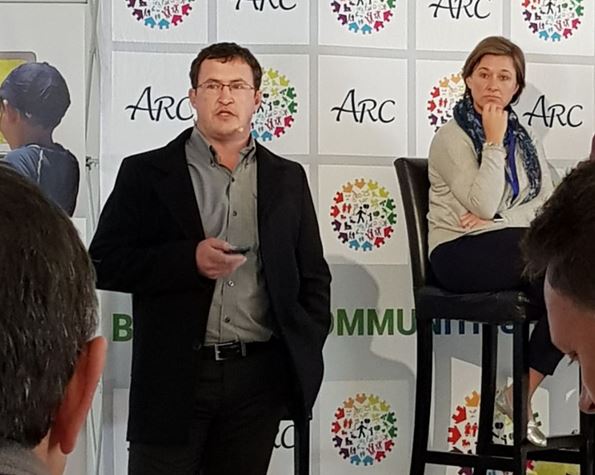One business area for many clubs which has suffered very noticeably, is in maintaining membership levels.
A cartoon in a Punch magazine of the 1980’s depicts a superior looking golf club official sitting behind a very large, highly polished desk.
He is depicted looking down his nose at the humble applicant (perhaps supplicant might have been more appropriate in those days!) for club membership and is saying; “I’m afraid that the best we can offer you is an associate membership of our waiting list”.
These days are largely gone.
In the discussion, Innovation or Stagnation, both Francois Schoeman and Stuart Gillett, offered insights and advice at a strategic level of the type of thought processes that are most effective and suggested actions to change the state of play and trade a business creatively, but without panic, out of a flat spot, or financial crisis.
In terms of golf management, as Winston Churchill said “difficulties mastered are opportunities won” and if putting from the rough is what is required to get back on track, then although it may not be pretty – just do it!
At this point we shall look at the issue from an on the ground, or perhaps more appropriately, at the grass face perspective, and discuss the type of problems where the rule book, overall strategy and the manual need to put aside, in favour of an alternative approach to find the right solution.
The first area that needs to be tackled is the panic, or fear element which is often a quite natural reaction to problems.
Having calmed the nerves – the next step involves self-analysis and is therefore not innovative at all, but in fact retrospective.
The step back will be to check that the key goals of the business plan, both at a strategic and operational level, are in fact still relevant and achievable.
This sounds obvious, but clubs and businesses can often lose sight of their own key goals.
Taking a breather, to allow for an honest revaluation of these can make an enormous difference and have a calming effect in deciding on the next best steps.
If the problems cannot be successfully addressed by any revision to the overall strategic goals and the plan to achieve them, then agility, flexibility and innovation will come into play.
Some years ago, when I was at Southbroom Golf Club in what was then Natal in South Africa, we faced a conflict between the changed needs of what were the immediate and the overall long-term goals.
Part of the long-term strategy was to redevelop the clubhouse and its related facilities. This was to cope with the anticipated higher rounds’ number, resulting from marketing, events and promotional campaigns which had already been initiated.
In the mid 1980’s, South Africa as a whole was in a drought cycle and the lower holes on the golf course were built on very quick drying sandy soil.
An antiquated, manual sprinkler system and the lack of rain had exacerbated this problem.
It was therefore decided, after some heated debate it has to be stated, to modify the long-term development plans, to allow for an immediate intervention.
This would involve the installation of an improved automated irrigation system on these holes, to improve both their playing characteristics and aesthetics.
This is a simple example where the needs of the moment were effectively addressed, by not adhering slavishly to the overall long-term strategy.
One of the key challenges any manager will face will be communicating the need to putt from the rough to their board.
It can be frustrating when an obvious need to change an element within the overall business plan and seeing the benefits that will accrue is being ‘missed’, or the required decision-making process deferred, by the club’s board or management committee.
One very effective option can be to call on the services of an external professional opinion, in the form of a consultant.
Involving the services of a consultant prompts the question; what can a consultant do for your golf business and what should the expectations be?
Perhaps the first step should be to define what a consultant is and in possibly the simplest definition, it usually means an expert, in a particular field or fields, providing advice, or inputs, as a third party to a client for a fee.
Over the past twenty or so years, I have had the opportunity to work as a consultant on dozens of marketing, event, management and sales initiatives and projects.
These activities have been with an eclectic mix of clients, including a number of golf estates, where my involvement has generally been in the pre-opening phases of the development’s life.
More recently however a new trend has developed.
This has provided the opportunity for me to work with existing and mature golf estates, or golf clubs. These have largely been venues looking to re-launch and or ‘reinvent’ their business model.
Given the needs to find new revenues and income streams, within tightened budgets and therefore often reduced staff levels, the services of the ‘right’ consultant have become more relevant today than ever.
A consultant’s role is essentially to fill gaps in the existing management staff’s expertise, or a business’ understanding of its own particular marketplace.
The consultant will then build solutions to address the problems and gaps and, throughout the process, relate the business facts as they might find them.
The latter aspect means that this will not be a popularity contest, so that anyone wanting only to hear ‘good news’ and just to have their ego massaged, might be best served by not involving a consultant in their business.
The alternatives to this would be to ignore the gaps and carry on as usual, which is not an unfamiliar approach.
An alternative option will be trying to up-skill or rewire the incumbent staff.
This will be because most of the personnel will be custodial in terms of their original training, which prepared most of us in the business of golf to be goalkeepers and not goal scorers.
This re-wiring will not be an overnight task.
A further alternative would be to let go of under-performing staff and then employ replacements who have what are considered to be the requisite skills (not the most time efficient or cost-effective approach), or to employ a consultant to fill in the gaps.
What advantages does this last route offer?
The most immediate and obvious of these are:
• No holding costs through HR or pension concerns
• No labour law problems
• Controllable, traceable and defined inputs
• A fresh perspective and ideas
• The immediate availability of a pool of skills that are missing in the current management structure
Part 3 of this Business of Golf Discussion Series piece will continue to explore the benefits of using a consultant’s’ services.
John Cockayne Mobile 0027 (0) 73 8967931 & Email cathco@mweb.co.za
John’s eclectic business experience in tandem with his writing skills – makes him much sought after as a business consultant and writer. In terms of the latter, and amongst a number of current roles, he is the golf editor with, or a columnist for, a number of top platforms and publications including Destination Golf Travel Global, GolfVistaSA, GolfRSA and Business Day.
John is a very experienced event manager, has had extensive marketing experience, worked as a project consultant on three continents and has developed and run a travel agency and two tour operator businesses. He is also a Founder and Life member of the PGA of South Africa and is no stranger to working inside the ropes having held operational roles as a head professional, director of golf, club manager, coaching director and as a tournament official on the Sunshine Circuit.





